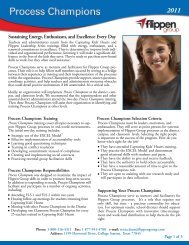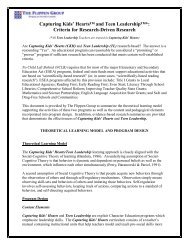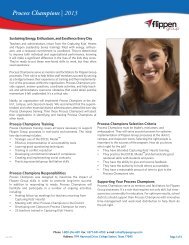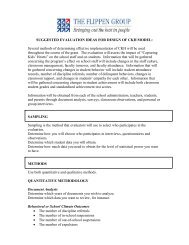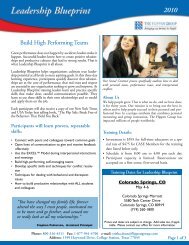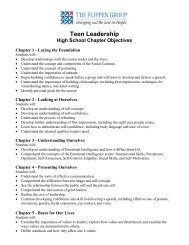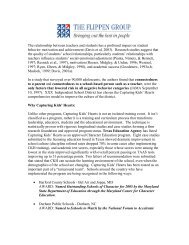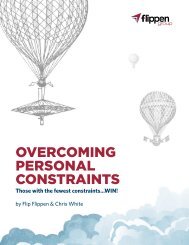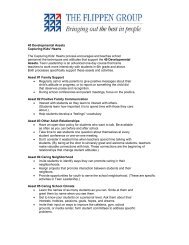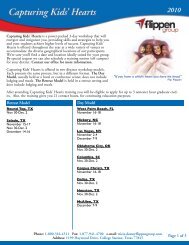Smart & Good High Schools - The Flippen Group
Smart & Good High Schools - The Flippen Group
Smart & Good High Schools - The Flippen Group
- No tags were found...
You also want an ePaper? Increase the reach of your titles
YUMPU automatically turns print PDFs into web optimized ePapers that Google loves.
CHAPTER 3: <strong>The</strong> Ethical Learning Communitygroup. 34 <strong>The</strong> report, What Works in Character Education,cites the just community as one of the high school characterdevelopment programs validated by research. 35In high schools, student governments established on thedirect democracy/just community model have taken oneof three forms:1. School-Within-a-School Model. About 100 students and asmall number of teachers form a semi-autonomous schoolwithin the larger school and meet weekly to discuss andmake decisions about issues related to discipline andsocial and academic life within their learning community.2. Whole-School “Town Hall” Model. <strong>The</strong> entire school—allstudents and staff—meet, usually weekly, to discuss andmake decisions about whole-school issues. (<strong>The</strong> schoolneeds a meeting space large enough to accommodate everyone.)3. Cluster Model. A school’s several clusters or academiesmeet separately to make decisions about cluster mattersand make proposals about schoolwide matters for subsequentconsideration by the entire school.For a case study of direct democracy based on the wholeschoolTown Hall model, see Chapter 5, Outcome 7,pages 186-188: Contributing Community Member andDemocratic Citizen.ELC 3: Have a voice: take a stand.Promising Practice 3:3.3 Develop faculty and staff voice.ELCA basic rule for an effective ELC is, “If youwant faculty and staff to do something withstudents—such as give them greater voice and responsibility—thenmake sure administration is treating faculty andstaff in the same way.”Research finds that students indemocratic schools develop greaterconcern for the welfare of the group.In Chapter 4, on Developing the Professional EthicalLearning Community, we describe how ELC principlescan be implemented with faculty and other school staff.Here we simply want to emphasize the need for consistency—andto call attention to the fact that in many schools,faculty and staff do not feel adequately consulted regardingdecisions that affect their lives and the school. Manyfaculties, for example, have little or no voice in planningtheir own professional development activities or in influencingwhole-school reform initiatives.ELC 3: Have a voice: take a stand.Promising Practice 4:3.4 Develop parent voice.ELCIncreasing parents’ voice and stake in theELC can be carried out in ways that parallelthose processes (e.g., surveys, membership in decisionmakinggroups) used to increase student and staff voice.In one comprehensive high school we visited, the principalholds a monthly open forum for parents called theParents Advisory Board (see box below). Between 50 and100 parents attend any given meeting.ELC 3: Have a voice: take a stand.Promising Practice 5:3.5 Develop community voice.ELCOne way to cultivate the wider community’sconcern for excellence and ethics in itsschools is to create community task forces that examineparticular areas of school life. One large high school(4,300 students) we visited said that an important part ofits philosophy of continuous improvement was going toTHE PARENTS ADVISORY BOARD:ONE PRINCIPAL’S EXPERIENCEIsend out a letter and schedule of the meetings to allfamilies, encouraging them to attend whateverthey’re interested in. I present the issues I want theirinput on, and then ask them what they want to discuss.Sometimes we jump-start the discussion with aguest speaker on an issue parents are interested in,such as someone from the police department who’s anexpert on drugs or gangs. In response to parents’requests at these meetings, we’ve added a prep sessionbefore standardized testing, shortened the summerathletic program from 6 weeks to 3 because familiesfelt their kids were overscheduled, and redesigned theparking area to better accommodate parents who havehandicapped kids. <strong>The</strong> Parents Advisory Board alsocreated a telephone network so that the school andparents can work together to ensure that student partiesare alcohol-free.47<strong>Smart</strong> & <strong>Good</strong> <strong>High</strong> <strong>Schools</strong>



